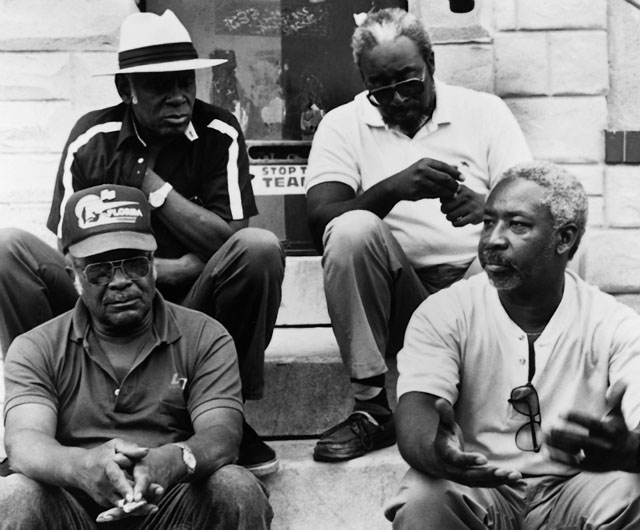“One of the most singular, and egregiously overlooked, filmmakers in the US, Tony Buba is a national treasure, the prime representative of the blue-collar, populist, politically-committed yet outrageously entertaining American filmmaking movement that’s largely missing-in-action,” declares Anthology Film Archives in the description of its series, Tony Buba: The Bard of Braddock, opening today and running through Tuesday. Both Justin Stewart, writing for the Film Comment, and Nick Pinkerton in the Voice note that Braddock, Pennsylvania, has served as a desolate, post-industrial location for both John Hillcoat’s adaptation of Cormac McCarthy’s The Road (2009) and George Romero’s Martin (1976)—and that Buba has worked on sound for a few of Romero’s films and appeared as the “Motorcycle Raider” in Dawn of the Dead (1978).
John Anderson in the New York Times: “[C]elebrated for chronicling the life and death of Braddock, and by extension the economic infrastructure of America, Mr. Buba (pronounced BOO-ba) was making experimental cinema long before the 21st-century ‘hybrid doc’ was smelting narrative and nonfiction in pursuit of an alloy…. Mr. Buba’s influences were typical. ‘You don’t steal, of course, you “pay homage to,”‘ he said, laughing. ‘But I saw Godard and Buñuel, there was a Stan Brakhage period, Third World Newsreel, Black Panther films. And there was this explosion of 16 millimeter, which was “the people’s medium” at that time. And a lot of the motivation was politics. I wanted to make political documentaries.'”
He did, but he didn’t stop there. Nick Pinkerton: “A mixture of his die-hard provincialism, anti-careerism, and genuine limitations—of Buba’s fiction feature, 1994’s No Pets, the less said the better—kept Buba from ever becoming a franchise, but one suspects that today, he is exactly what he set out to be: a local institution.”
Also in New York. MoMA’s Werner Schroeter retrospective is on through Monday and, for the House Next Door, Ela Bittencourt reviews Elfi Mikesch’s documentary on the late filmmaker, Mondo Lux.
In other news. Movieline has not only laid off Stephanie Zacharek, it’s “eliminated” her position, “Chief Critic.” In his report for Criticwire, Matt Singer writes, “I know I speak for a lot of people when I say she was the number one reason I visited the site.” Before she joined Movieline in April 2010, Stephanie’d been a film critic for Salon for 11 years.
Reading. Ted Fendt‘s posted fresh translations of Luc Moullet’s pieces on Vincente Minnelli’s Designing Women (1957) and The Cobweb (1955).
John Bleasdale talks with Sion Sono about Himizu for Electric Sheep, which has gathered its reviews of some of his previous films: Guilty of Romance, Cold Fish, Love Exposure, and Suicide Club. Also: Virginie Sélavy talks with Béla Tarr and John Berra reviews Kaneto Shindô‘s The Naked Island (1960), “arguably one of the masterpieces of the Japanese New Wave, yet the saga of its production is just as compelling as the events depicted on screen.”
For the New York Times, Dennis Lim reports on Vincent Gallo’s determination to keep Promises Written in Water (2010) off screens.
DVD/Blu-ray. Once again, Dennis Lim, here in the Los Angeles Times: “[N]o movie on the [current economic crisis] has combined populist outrage, social critique and entertainment value with as much flair as Hong Kong director Johnnie To‘s Life Without Principle (2011), new to DVD and Blu-ray from Indomina Releasing.”
In the works. “Since breaking out with his award-winning (and Academy Award-nominated) sophomore feature Dogtooth, Greek filmmaker Yorgos Lanthimos has amassed quite a fanbase, leading many to wonder whether he’d soon take the plunge and make a film in English,” writes Nigel M. Smith. “During a long discussion with Indiewire in Manhattan earlier today (for an upcoming profile tied to his third release Alps, which opens July 13 in New York), Lanthimos said he currently has not one but three English-language scripts in the works—two original, one a potential work for hire.”
Vulture‘s Claude Brodesser-Akner hears that Steven Knight (Dirty Pretty Things) will direct Viggo Mortensen in a sequel to David Cronenberg’s Eastern Promises (2007) and that Vincent Cassel’s in talks to join the cast.
The Playlist‘s Kevin Jagernauth has some “wonderfully strange” images from Michel Gondry’s forthcoming feature, Mood Indigo, starting Audrey Tautou, Romain Duris, and Omar Sy.
“Focus Features is making a rights deal for David Grann’s massive article in the May 28 issue of The New Yorker, ‘The Yankee Commandante’ with George Clooney attached to direct,” reports Deadline‘s Mike Fleming. Also: Roland Emmerich will direct Jamie Foxx (the President!), Channing Tatum (a Secret Service agent) and Maggie Gyllenhaal in White House Down.
Cary Fukunaga (Jane Eyre) will direct a two-part adaptation of Stephen King’s It. Borys Kit has details in the Hollywood Reporter.
Viewing (8’47”). Bille August is currently shooting Night Train to Lisbon and Cineuropa visits the set to talk with the director and cast members Jeremy Irons, Bruno Ganz, August Diehl, and Jack Huston.
More viewing. At Film Studies for Free, Catherine Grant posts “a series of very extensive, and very wonderful, masterclasses given by Adrian Martin, Jonathan Rosenbaum and Jacques Rancière in Brussels in 2011.”
Obits. “Although the cinematographer Christopher Challis, who has died aged 93, was an essential member of the Archers production company of Michael Powell and Emeric Pressburger, he joined them as director of photography at the time of their decline,” writes Ronald Bergan for the Guardian. “However, he worked on more of the great British writing-directing team’s films than any other cinematographer. These eccentric, extravagant, intelligent and witty fantasies went against the British realist tradition, allowing more scope for a creative cinematographer such as Challis. The sensuous use of Technicolor and flamboyant sets and designs made them closer to the MGM world of Vincente Minnelli and of Stanley Donen, who used Challis on six of his films.”
“Composer James Bennett, who brought musical wit and a lyrical touch to his work in film and theater, died in New York this week of a heart attack,” writes director Tom Kalin for Filmmaker. “Though Jim composed music for only two feature films—Todd Haynes’s Poison and my film Swoon—he brought a remarkable musical sophistication and depth of emotion to his work.”
For news and tips throughout the day every day, follow @KeyframeDaily on Twitter and/or the RSS feed. Get Keyframe Daily in your inbox by signing in at fandor.com/daily.





